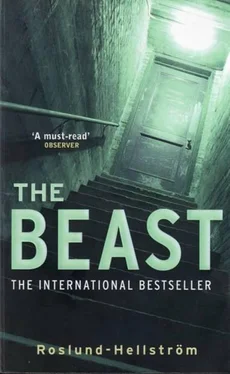By now he had had the time to discover that his workmates of thirty-four years’ standing were nothing but tea-break friends, bad-mouthing-the-boss friends, doing-the- pools-in-the-lunch-break friends. None of them had been in touch since he had left, but then he hadn’t sought them out either, and he wasn’t sure that he missed any of them. It’s odd, he reflected, how you can pass a lifetime in the company of folk you care so little for and need no more than you need the sitting-room telly on. They’re around because they’re around, become habit. Being with them is almost like a ritual, it covers up emptiness and silence. It reassures you that you exist for them, but they really mean sweet FA. And vice versa, of course. You leave, but nothing changes; they carry on mixing juice and doing the pools and chaffing away over their tea-mugs.
He held her hand harder.
He saw her much more clearly now.
His Margareta was still at work in the factory on the site next to his. She had two years left before retirement, two more years of leaving the house every weekday. He had never realised until now how much he needed her; their time together meant life and the courage to grow old.
Walking close together and never too far away from home, they followed more or less the same route over the bridge and into the woodland and then back; it was their daily stroll late in the afternoon after she had come home from work. He would wait for her with his outdoor clothes on; the last hour alone was the worst because he longed for her so very much, longed to walk together, stepping out a little and breathing in a shared rhythm. During the dark months of the year they’d follow one of the set tracks marked by little posts with coloured signs, but between late spring and early autumn, when the evenings were light, they strayed, walking on mats of blueberry plants between the tall spruce trees. Life was fading for them both, but it was still fun to try and find new ways on your own.
They had done just that this afternoon. Holding hands, they left the proper path and set out across the bone-dry, rustling forest floor. The summer had been too hot, for too long. This year would be terribly poor for mushrooming.
They didn’t talk much, there was no need to after forty- three years of marriage. But they watched. A roe deer. A couple of hares. Birds, one looked like a hawk of some kind. One of them would point, both stopped and waited until the animal moved on. They weren’t in a hurry. Then the ground changed, became hillier, and they breathed more vigorously, enjoying the sense of oxygen-rich blood flowing faster in their veins. They were scrambling up a hillside cluttered with large scree when the air filled with noise.
It was a helicopter, staying low and circling among the tops of the trees. Then another one. Both carried police markings.
Rune and Margareta watched, staring without knowing why they did, nor why both of them felt a surge of unease and anxiety. It had something to do with the machines’ intrusiveness and intense engine noise. The police were after something in a hurry, looking for it right here.
Margareta stood very still, her eyes following the helicopters until they disappeared from the sky above them.
‘I don’t like them,’ she said.
‘Neither do I.’
‘Let’s not walk on.’
‘Not until they’re well and truly gone.’
‘Not even then.’
She had held her husband’s hand but now she pulled at his arm until it was round her waist; that was where she wanted it to be. He kissed her cheek lightly. The two of them stood together against the world with its helicopters and uniforms and noise. But she wanted to leave at once, and in her anxiety she needed him to hold her close. He looked at her full of concern, because she was never usually afraid. She was the more courageous of the two of them, he thought.
Then, far away where the trees were thinning, he saw them, a policeman and his dog. They were moving slowly, the dog was looking for something, leading the man westwards, in the same direction as the helicopters had flown.
‘Goodness. One of those as well.’
‘It mightn’t be about the same thing.’
‘Come on, it’s got to be.’
Now they were convinced that something had happened, here in their wood, during their private break from the outside world.
They hurried down the slope and through the dense shrubs at its base, their measured pace and breathing rhythm broken; all that was gone now. They wanted to get out of the way of someone else’s hunt, someone else’s misery.
It was Margareta who saw it first.
A bright red thing.
A small shoe. A little girl’s.
A red, shiny leather shoe, with an eye-catching metal buckle.
They had been walking as fast as they could. She ignored the shooting pains in her knee joints, and when Rune asked if she was all right, she just shook her head, pointing ahead to the fastest short cut, never mind if the going was harder. Better than having time to think about the gathering darkness around them, better than dealing with Rune’s worries about her. They had covered almost a kilometre. Not far to the metalled lane and the houses now.
To pass a huge fir they let go of each other, walking round the tree on opposite sides.
She spotted something under the fir’s sweeping branches and thought at first that it was a toadstool, prodded it with her foot, lifted it up. Twisting it round in her hands, she understood what it meant and looked around: where is she? Is she still here? The girl?
She didn’t scream, only called out; it was no surprise to her after all. She held the red shoe gently and handed it to Rune when he came up to her.
One more morning with the lie lurking in the back of his mind. He had been lying close to her, his hand touching her breasts, belly, thighs, he had kissed the back of her neck, whispered good morning into her ear, all the time doing his best to avoid having to face his betrayal.
Now Lennart Oscarsson was in his office, watching through the window as the prison woke to a new day. Another lovely sunny day, as hot as yesterday, as every day last week. He sighed.
Ever since he had fallen in love with Karin he had been haunted by fantasies about the day when she would ask him to accept that she’d met someone else, and that she was leaving him. Instead it was he whose love of another would break up their shared life. Who’d have believed it? She was beautiful, his looks were quite ordinary. She was outgoing, he was withdrawn. Her personality glittered, his never would. And yet it was he who had put their closeness at risk.
He had to go down to Lund’s unit. On the way he nodded to two faces from the groups of trainees, people who wished they’d been placed anywhere but in a sex offender unit for their half-year of learning on the job. They despised their charges, not that he didn’t feel the same; they all did, the staff spat at the perverts all the time.
The unit was silent and empty, an abandoned corridor, closed doors. The inmates were in the workshop; all were on work assignments, which is to say they did wood-turning, rings and building bricks to make educational toys, for a couple of kronor per hour. And whatever else was wrong with sex offenders, you had to admit that they trotted off to produce whatever rubbish was demanded of them without a murmur, no pissing about on the whole, unlike the so-called normals, drug-crazed would-be lifers, guys inside for robbery and violence and fraud, non-stop trouble the lot of them, either going on strike or doing a sickie.
He stopped outside cell 11, Bernt Lund’s empty cell, let himself in. Lund was still on the loose, halfway through day two. They mostly couldn’t cope for long; it took concentration to keep out of sight, always stay watchful, do without sleep, and it also required strength and money. Chased by dozens of policemen, trailed by the public on the alert, the hiding places grew fewer with every breath.
Читать дальше













